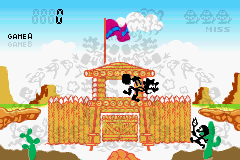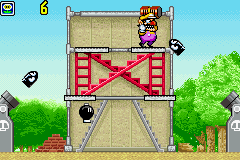Fire Attack: Difference between revisions
m (Text replacement - "Category:Super Smash Bros. Ultimate Spirits" to "Category:Super Smash Bros. Ultimate spirits") |
|||
| Line 23: | Line 23: | ||
===Classic version=== | ===Classic version=== | ||
[[File:Fire attack gba.png|thumb|left|240px|The Classic version of ''Fire Attack'' from ''Game & Watch Gallery 4'']] | [[File:Fire attack gba.png|thumb|left|240px|The Classic version of ''Fire Attack'' from ''Game & Watch Gallery 4'']] | ||
''Fire Attack'' involves a cowboy who is using a [[hammer]] to try to stop attackers (represented as stereotypical Native Americans) from burning down his base. Every time the player hits a torch or an attacker, they receive two [[point]]s. As the game progresses, the player will have to be a lot more cautious as more attackers appear, and the torches and attackers will eventually move faster. If an attacker manages to set the base on fire, the player will get a miss. If the player reaches 200 or 500 points without any misses, every torch or attacker the player hits will be worth five points for 30 to 50 seconds. If the player has any misses at either score, all misses will be removed instead. When the player gets three misses, they receive a [[Game Over]]. In Game A, attackers come from three directions, but they change positions and come from different directions after a miss is made. In Game B, attackers come from four directions, and the game gets faster sooner. In the ''Game & Watch Gallery 4'' version, attackers have had their head feathers and cloths removed to make them appear as bandits instead, likely due to concerns over racial insensitivity. | |||
{{br|left}} | {{br|left}} | ||
Revision as of 06:24, October 20, 2021
- Not to be confused with Fire (Game & Watch).
Fire Attack is a Game & Watch game that was released as part of the Wide Screen series on March 26, 1982. A display of this title can be unlocked in Game & Watch Gallery, but it is also a playable title in Game & Watch Gallery 4, which includes an updated "Modern" version of the game.
The alarm indicator of this game is musical notes that are located below the miss counter, and the cowboy plays the bugle when the alarm goes off.
Gameplay
Classic version
Fire Attack involves a cowboy who is using a hammer to try to stop attackers (represented as stereotypical Native Americans) from burning down his base. Every time the player hits a torch or an attacker, they receive two points. As the game progresses, the player will have to be a lot more cautious as more attackers appear, and the torches and attackers will eventually move faster. If an attacker manages to set the base on fire, the player will get a miss. If the player reaches 200 or 500 points without any misses, every torch or attacker the player hits will be worth five points for 30 to 50 seconds. If the player has any misses at either score, all misses will be removed instead. When the player gets three misses, they receive a Game Over. In Game A, attackers come from three directions, but they change positions and come from different directions after a miss is made. In Game B, attackers come from four directions, and the game gets faster sooner. In the Game & Watch Gallery 4 version, attackers have had their head feathers and cloths removed to make them appear as bandits instead, likely due to concerns over racial insensitivity.
Modern version
The Modern version of Fire Attack involves Wario, who is trying to protect a giant golden statue of himself from a bunch of Bob-ombs and Bullet Bills. During his defense, however, Wario has to be careful not to hit any hens or apples, as they award him five and seven bonus points, respectively. The player is not penalized for hitting a hen or apple, but the player does get a miss if a Bob-omb or Bullet Bill manages to destroy parts of Wario's fort. It is Game Over if Wario's statue gets destroyed. However, Wario can remove one miss when he gets 200, 500, and 700 points by catching a heart coming from a Bill Blaster. This version also features music, with the tempo changing depending on the speed of the game.
If the player selects the game yet waits several moments to start it, a humorous scene is shown. In particular, Wario is using a hoe to till the ground as his hen is walking around near a tomato field. However, while Wario is taking a break to wipe off sweat, he is oblivious to a Bob-omb rolling up behind him, and he is sent flying by the explosion (with the hen noticing the Bob-omb at the last moment and proceeding to flee before it exploded).
Controls
 : Move
: Move and
and  : Hit
: Hit and
and  : Diagonal
: Diagonal
Gallery
Trivia
- In Super Smash Bros. Ultimate, Mr. Game & Watch's animations were changed to closer resemble the actual Game & Watch games. This resulted in the appearance of his forward smash being changed to match the original design of the enemy characters from Fire Attack, with the feather on their head that was previously edited out of the version of the game in Game & Watch Gallery 4. This caused an online backlash, and Nintendo of America responded by announcing an update patch to remove the feather.[1]
External links
References
| Game & Watch games | ||
|---|---|---|
| Super Mario franchise | Donkey Kong (1982, MS) • Mario Bros. (1983, MS) • Mario's Cement Factory (1983, TT/NWS) • Mario's Bombs Away (1983, PS) • Donkey Kong Hockey (1984, MVS) • Super Mario Bros. (1986, CrS | 1987, Sp | 1988, NWS) • Mario the Juggler (1991, NWS) • Game & Watch: Super Mario Bros. (2020, CoS) | |
| Donkey Kong franchise | Donkey Kong (1982, MS) • Donkey Kong Jr. (1982, NWS | 1983, TT & PS) • Donkey Kong II (1983, MS) • Donkey Kong 3 (1984, MVS) • Donkey Kong Circus (1984, PS) • Donkey Kong Hockey (1984, MVS) | |
| Miscellaneous | Green House (1982, MS) | |
| MS: Multi Screen • TT: Table Top • PS: Panorama Screen • NWS: New Wide Screen • MVS: Micro VS. System • CrS: Crystal Screen • Sp: Special • CoS: Color Screen | ||









